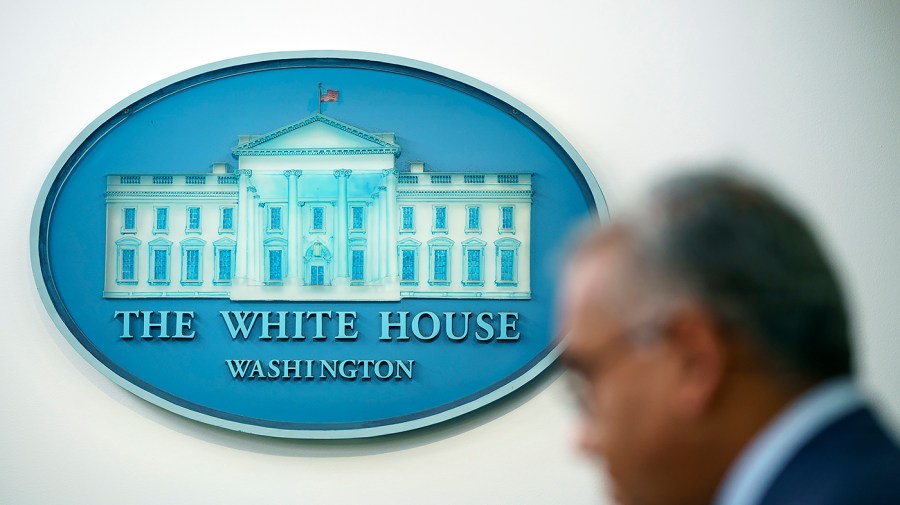The biggest events of 2022

In today’s issue of NotedDC, we’ll look back at some of the biggest political and global events in 2022, shaping life in the U.S. and abroad.
Plus: Lawmakers race to fund the government and leave town before the storm, and senators give farewell speeches.
BRIEFLY
- The Senate on Thursday voted to pass a $1.7 trillion omnibus package that funds the federal government through September, provides Ukraine with $45 billion in military and economic aid and sets aside $38 billion for emergency disaster assistance.
- The Federal Communications Commission this week proposed a record-breaking nearly $300 million fine for an alleged robocall scheme that involved billions of calls about auto warranties.
- While the Northeast and Midwest are losing residents, Southern states grew by more than 1.3 million people in 2022, according to data from the U.S. Census Bureau.
War, shootings and domestic discord dominate year

2022 was defined by the breakout of war in Europe and huge domestic moves in the U.S., with implications stretching well into the new year.
Here’s a look at some of the most significant events that captivated Washington:
WAR IN UKRAINE
Russia’s invasion of Ukraine, which began Feb. 24, raised the specter of broader war in Europe and consolidated Western support for Kyiv against Moscow’s aggression.
The U.S. response to the invasion has included imposing sanctions on Russia and sending tens of billions of dollars in aid to Ukraine, most recently including $45 billion in aid in the year-end spending package as the war stretches past its 10th month.
Ukrainian President Volodymyr Zelensky addressed Congress on Wednesday night, urging continued support for the country.
Some Republicans have pushed back on the aid. House Minority Leader Kevin McCarthy (R-Calif.) said in October that while he supports efforts to defense Ukraine, “there should be no blank check on anything. We are $31 trillion in debt.”
The conflict has impacted global energy markets. Our colleague Alex Gangitano wrote in June that rising gas prices in the U.S. were “exacerbated by the war in part due to the disruption it has caused on global energy markets due to sanctions placed on the Kremlin by the Biden administration and Western Europe.”
ROE OVERTURNED
On June 24, the Supreme Court struck down the decades-old Roe v. Wade decision that legalized abortion nationwide, shifting focus to state efforts on abortion.
“The Constitution does not confer a right to abortion; Roe and Casey are overruled; and the authority to regulate abortion is returned to the people and their elected representatives,” the conservative-majority court ruled.
The 6-3 decision in Dobbs v. Jackson allowed enforcement of state laws restricting abortion earlier in pregnancy. The issue became a major rallying cry for many Democrats, who framed the midterms as an election about reproductive rights.
California, Michigan and Vermont voters later enshrined abortion rights in their state constitutions via ballot measures.
MAR-A-LAGO RAID
On Aug. 8, the FBI raided former President Trump’s Mar-a-Lago property in Palm Beach, Fla. The search turned up classified documents Trump had stored there.
A Department of Justice (DOJ) investigation is ongoing.
Several Republicans criticized the raid, with some House GOP members promising their own probes into the FBI and DOJ in 2023.
The raid was tied to one of several legal threats Trump has faced this year, including a civil fraud case brought by New York Attorney General Letitia James (D).
MIDTERM ELECTIONS
It wasn’t the “red wave” many expected, but Republicans did win the House by a slim margin — guaranteeing divided control of government come January.
The House’s final partisan divide for the 118th Congress was 222-213 — marking the best midterm result for a sitting president’s party in two decades. (Given the vacancy in Virginia’s 4th, the new Congress will begin with 212 Democrats.)
In the Senate, Democrats netted a seat — increasing their effective majority to 51.
At the state level, Republicans will start 2023 controlling 26 governorships to Democrats’ 24. Democrats had a net gain of two governorships in elections this year, picking up Arizona, Maryland and Massachusetts while Republicans flipped Nevada.
JAN. 6 PROBE CONCLUDES
A year full of hearings and subpoenas is culminating in the Jan. 6 select committee’s final report due out Thursday. Its investigation into the Capitol riot on Jan. 6, 2021 comes to an end with the committee making criminal referrals against Trump, recommending an ethics inquiry into several Republican lawmakers and recommending legislation to prevent another similar event.
TRUMP 2024 ANNOUNCEMENT
On Nov. 15, Trump announced his third White House bid from Mar-a-Lago.
In recent months, several Republicans have hinted at their own 2024 presidential bids or been discussed as possible contenders, including Florida Gov. Ron DeSantis, former Vice President Mike Pence, former Secretary of State Mike Pompeo and Arkansas Gov. Asa Hutchinson.
NEW GUN LAW, MASS SHOOTINGS
2022 was marked by several more high-profile mass shootings, including in Uvalde, Texas; Buffalo, N.Y.; Highland Park, Ill.; Colorado Springs, Colo.; and Chesapeake, Va.
On June 24, Congress sent the Bipartisan Safer Communities Act to President Biden’s desk for his signature, “marking the first time in nearly 30 years Congress has approved major legislation to combat gun violence.”
The law expands background checks for people under 21 and includes funding for red flag law administration and mental health treatment.
Some of the latest mass shootings of the year happened just weeks before this month’s 10-year anniversary of the Sandy Hook elementary school shooting.
🌨 Proxy voting spikes as winter weather moves in

Members of the House are getting what could be their final round of proxy voting in this week as severe winter weather and freezing temperatures roil the country.
- Nearly 200 members currently have active proxy letters, designating another member to vote in their place because they wouldn’t be able to vote in person, according to House Clerk records.
- Of those, at least 164 have been filed just since Monday — with that number continuing to climb throughout Thursday.
- For example, Rep. Joe Neguse (D-Colo.) was the designated proxy voter for several of his colleagues until Thursday, when he designated his own proxy: Rep. Ed Perlmutter (D-Colo.).
Congress currently is still in session as lawmakers race to pass a massive spending package and prevent a government shutdown on Friday.
Background: The House adopted proxy voting in 2020 as a safety measure during the COVID-19 pandemic, though the practice remains in place, even as the Capitol complex has reopened to the public and members are no longer required to wear face masks.
Members still must write in their letters that they are “unable to physically attend proceedings in the House Chamber due to the ongoing public health emergency.”
The Senate never adopted a proxy mechanism, so all 100 members have been required to show up to vote in person. Vice President Harris also had to be on call to break tie votes in the 50-50 split chamber.
A push to end it: House Republicans largely objected to proxy voting at its start, with House GOP Leader Kevin McCarthy (R-Calif.) and others filing a lawsuit to stop the practice. The challenge ultimately was unsuccessful.
- McCarthy, who wants to be House Speaker when Republicans take control of the chamber next month, has vowed to end proxy voting.
- “We will immediately reopen the Capitol and end the Democrat proxy voting and remote work schemes that have inflicted untold damage to this institution,” he said in his pitch to be elected Speaker.
Still, others have argued that it’s served as a valuable tool, and several Republicans were among the filers this week.
“Ending proxy voting makes democracy less stable by taking away an emergency mechanism that allows for the continuity of Congress,” Daniel Schuman, policy director at Demand Progress, said. “It must always be ready to act to respond to world events and to check the executive branch.”
🌡 Biden sends staffers home early amid storm

President Biden on Thursday urged would-be travelers across the country to heed extreme weather advisories and “leave now” before conditions worsen. And he backed it up by sending his own staffers on their way if they had travel plans.
“I’m telling them to leave now,” he said ahead of a briefing with FEMA and the National Weather Service. “They can talk to me on the phone. It’s not life and death, but it will be if they don’t get out.”
It’s unclear how many White House aides took him up on the offer.
To the American public, Biden gave the same advice: “I don’t know whether your bosses will let you, but if you all have travel plans, leave now.”
The president urged people to consult Weather.gov for the latest on the extreme winter storm and cold conditions that have blanketed the country, forcing the cancelation of thousands of flights.
“It’s dangerous and threatening. This is really a very serious weather alert here, and it goes from Oklahoma all the way to Wyoming, and Wyoming to Maine,” Biden said.
“This is not like a snow day, you know, when you were a kid–this is serious stuff,” he added.
Pelosi holds final weekly press conference as Speaker

House Speaker Nancy Pelosi (D-Calif.) held her final weekly press conference as Speaker on Thursday as she prepares to step back from Democratic leadership ahead of Republicans taking over the chamber next month.
“All of you are guardians of democracy,” she told reporters in the room. “Our founders knew that freedom of the press is foundational to government of, by and for the people, informing the public about the work done in their name.”
Pelosi said she didn’t want to be a “mother-in-law” trying to school her GOP successor, who will be elected by a majority of the House when the new term starts next month.
“I’m just hoping that on Jan. 3 that [they will] be expeditiously able to elect a Speaker so that we can get on with the work of the Congress,” she said.
The longtime Democratic leader reflected on her role as the first female House Speaker and the gains that she’s seen since joining the House three decades ago.
“I came to Congress, there were 23 women —12 Democrats and 11 Republicans — out of 435 people,” she said. “So some of us just made a decision: We have to change this. We have to recruit, we have to encourage women to run, give confidence to them.”
Today there are 122 women in the House, 90 Democrats and 32 Republicans.
THROWBACK THURSDAY
Ukrainian President Volodymyr Zelensky‘s address to a joint session of Congress this week served as a historic reminder of British Prime Minister Winston Churchill‘s address 81 years ago — nearly to the day.
Revisiting Churchill’s address: It came less than a month after the attack on Pearl Harbor brought World War II to American soil. The bombing prompting President Franklin D. Roosevelt to declare the United States had officially joined the war that at that point had already been waging for two years overseas.
Much like Zelensky, Churchill’s aim was to make a direct appeal to Congress for assistance and stress the ties between the United States and Great Britain.
“It is not given to us to peer into the mysteries of the future. Still, I avow my hope and faith, sure and inviolate, that in the days to come the British and American peoples will, for their own safety and for the good of all, walk together in majesty, in justice and in peace,” Churchill said in closing his 30-minute address.
You can read and listen to the whole speech at America’s National Churchill Museum.
QUOTABLE
“That was a 12-minute vote. We can do two minutes better. Please stay in your seats.”
– Senate Majority Leader Charles Schumer (D-N.Y.) pressing senators to speed up votes to get out of town as a winter storm hits.
NUMBER TO KNOW
2,200+
Number flights canceled on Thursday because of severe winter weather across the country. More on the issue here.
ONE MORE THING
Warm moments from outgoing senators’ farewell speeches

Six senators are retiring from Congress on Jan. 3 — five Republicans and one Democrat. Here are some memorable quotes from their farewell addresses:
Sen. Roy Blunt (R-Mo.) said, “What we do here is more important than who we are. Thanks for letting me do part of it with you.”
Sen. Richard Burr (R-N.C.) said, “Our nation’s history is crystallized here in this building … If you listen closely at night, when all around is quiet, you can hear the echoing voices of the ordinary men and women who became giants in our nation’s history. Sam Rayburn, Margaret Chase Smith, Everett Dirksen, Barbara Jordan, John Dingell, Tom Coburn, Barbara Mikulski, John Lewis and so many more.”
Sen. Patrick Leahy (D-Vt.), the third-longest-serving U.S. senator in U.S. history at 48 years, on what he’d say to himself “nervously walking for the first time onto the Senate Floor”: “‘Don’t lose that sense of awe, kid. Hold on to it. Treasure it. Don’t even for a minute forget what a privilege and a responsibility it is to serve here.’ I never have forgotten.”
Sen. Rob Portman (R-Ohio) said, “While I will no longer be a member of this body, I urge all of us to remember that there is more that unites us than divides us.”
Sen. Richard Shelby (R-Ala.), who was first elected as a Democrat in 1986, said bipartisanship “is important because it is good for the country. It is important because it brings people together. It is important because we all have our differences in philosophy, but the country, I believe, should be first, the Nation should be first.”
Sen. Pat Toomey (R-Pa.) said he and his wife, Kris, recently had their 25th wedding anniversary: “I think I’ll spend the next 25 years letting her know how much I appreciate her.”
That’s all for this week, thanks for reading! Explore more newsletters from The Hill here.
Copyright 2023 Nexstar Media Inc. All rights reserved. This material may not be published, broadcast, rewritten, or redistributed.

